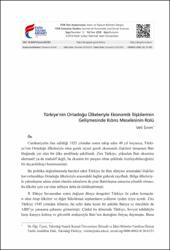| dc.contributor.author | Sırım, Veli | |
| dc.date.accessioned | 2018-12-26T14:00:12Z | |
| dc.date.available | 2018-12-26T14:00:12Z | |
| dc.date.issued | 2018-12 | |
| dc.identifier.citation | SIRIM, Veli. "Türkiye’nin Ortadoğu Ülkeleriyle Ekonomik İlişkilerinin Gelişmesinde Kıbrıs Meselesinin Rolü." FSM İlmî Araştırmalar İnsan ve Toplum Bilimleri Dergisi, 12 (2018): 75-107. | en_US |
| dc.identifier.uri | http://dergipark.gov.tr/fsmia/issue/41565/502193 | |
| dc.identifier.uri | https://hdl.handle.net/11352/2818 | |
| dc.description | Araştırma makalesi | en_US |
| dc.description.abstract | Cumhuriyetin ilan edildiği 1923 yılından sonra takip eden 40 yıl boyunca, Türkiye’nin
Ortadoğu ülkeleriyle olan gerek siyasî gerek ekonomik ilişkileri tamamen Batı
bloğunda yer alan bir ülke profilinde şekillendi. Zira Türkiye, yükselen Batı eksenine
alternatif ya da muhalif değil, bu eksenin bir parçası olma şeklinde özetleyebileceğimiz
bir dış politikayı benimsemişti.
Bu politika doğrultusunda hareket eden Türkiye ile Batı dünyası arasındaki ilişkiler
kuvvetlendikçe Ortadoğu ülkeleriyle arasındaki bağlar giderek zayıfladı. Bölge ülkeleriyle
yakınlaşma adına atılan olumlu adımların da yine Batılılaşma amacına yönelik olması,
bu ülkeler için var olan tabloyu daha da kötüleştirmişti.
II. Dünya Savaşından sonra değişen dünya dengeleri Türkiye ile yakın komşuları
olan Arap ülkeleri ve diğer Müslüman toplumların yollarını iyiden iyiye ayırdı. Zira
Türkiye 1945 yılından itibaren, bu sefer daha kesin bir şekilde Batıya ve öncelikle de
ABD’ye yanaşma çabasını göstermişti. Çünkü bu dönemde Türkiye, Sovyet tehdidiyle
karşı karşıya kalmış ve güvenlik endişesiyle Batı’nın desteğine ihtiyaç duymuştu. Buna karşılık Ortadoğu ülkelerinde güçlenen milliyetçilik akımlarıyla birlikte yükselen bir Batı
karşıtlığı vardı. Üstelik Sovyetlerden gelecek bir tehdit algıları da yoktu.
Türkiye ile Ortadoğu ülkeleri arasındaki uçurum 1960’lı yılların ortalarına kadar
giderek derinleşti. 1960 yılından itibaren bu uçurumun kapanmasına, bölge ülkeleriyle
önce siyasi, sonra ekonomik ilişkilerin gelişmesine sebep olan gelişmeler peşpeşe yaşandı.
1964’te Kıbrıs’a yapılması planlanan askerî bir müdahaleyi önleyen Johnson Mektubu
ve BM’de Kıbrıs konusunda yapılan oylamada olumsuz karar çıkmasıyla Türkiye’nin yaşadığı
büyük hayal kırıklığı Batı güdümündeki dış politikanın terk edilerek çok yönlü ve
alternatifli bir dış politikanın hayata geçirilmesine imkan sağladı. Bu köklü değişikliğin
en önemli uygulama alanı ise, kaçınılmaz olarak Ortadoğu ülkeleri olmuştu.
Bu makalede, 1964’te başlayan, 1973 Petrol Krizi ve 1974 Kıbrıs Barış Harekatı ile
iyiden iyiye belirginleşen Ortadoğu politikamızdaki değişiklik ele alınacak, bu politika
değişikliğinin ekonomik ilişkilerimizdeki yansımaları üzerinde durulacaktır. | en_US |
| dc.description.abstract | Throughout the following 40 years after the year 1923 when the republic was proclaimed,
Turkey’s political and economic relations with Middle Eastern countries were
shaped in the profile of a country that was entirely within the Western bloc. That was
because Turkey had adopted a foreign policy that we can summarize as being neither an
alternative nor a dissident to the emerging Western axis, but becoming a part of it.
As the relations between Turkey acting in accordance with this policy and the Western
world grew stronger, the ties between Turkey and the Middle Eastern countries gradually
weakened. The fact that the positive steps taken in the name of convergence with
the countries in the region were again aimed at the purpose of Westernization had made
the existing picture for these countries worse.
The changing world dynamics after the World War II completely severed the ties
between Turkey and the Arab countries, which are its close neighbors, and other Muslim
societies as Turkey had made an effort from 1945 onward, this time more firmly, to
converge towards the West and primarily the United States. Because during this period,
Turkey had faced the Soviet threat and needed the West’s support with security concerns.
On the other hand, there was an emerging Anti-Westernism in the Middle East countries with the strengthening nationalist movements. Moreover, they had no perception of a
threat from the Soviets.
The gap between Turkey and the Middle Eastern countries deepened gradually until
the mid-1960s. From 1960 onwards, consecutive developments resulting in the closing
of this gap and advancement in political, then economic relations with the countries in
the region emerged. Turkey’s big disappointment resulting from the Johnson letter, which
prevented a planned military intervention to Cyprus in 1964 and the negative result from
the voting on Cyprus at the UN enabled it to abandon the Western guided foreign policy
and implement a versatile foreign policy with alternatives. The most important application
area of this fundamental change was inevitably the Middle Eastern countries.
In this article, the change in our Middle East policy that started in 1964 and became
increasingly evident with the 1973 Oil Crisis and the 1974 Cyprus Peace Operation will
be discussed and the reflections of this policy change on our economic relations will be
emphasized. | en_US |
| dc.language.iso | tur | en_US |
| dc.publisher | FSM Vakıf Üniversitesi | en_US |
| dc.rights | info:eu-repo/semantics/openAccess | en_US |
| dc.subject | Türk dış politikası | en_US |
| dc.subject | Dış ekonomik ilişkiler | en_US |
| dc.subject | Ortadoğu | en_US |
| dc.subject | Kıbrıs meselesi | en_US |
| dc.subject | Turkish foreign policy | en_US |
| dc.subject | Foreign economic relations | en_US |
| dc.subject | Middle east | en_US |
| dc.subject | Cyprus issue | en_US |
| dc.title | Türkiye’nin Ortadoğu Ülkeleriyle Ekonomik İlişkilerinin Gelişmesinde Kıbrıs Meselesinin Rolü | en_US |
| dc.title.alternative | The Role of the Cyprus Issue in the Development of Economic Relations Between Turkey and Middle Eastern Countries | en_US |
| dc.type | article | en_US |
| dc.contributor.department | FSM Vakıf Üniversitesi, FSM İlmî Araştırmalar İnsan ve Toplum Bilimleri Dergisi | en_US |
| dc.relation.publicationcategory | Makale - Ulusal Hakemli Dergi - Kurum Öğretim Elemanı | en_US |



















